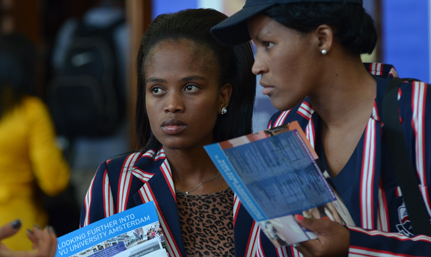|

|
Staff and students gain a wealth of information at the first Study Abroad Fair hosted on the Bloemfontein Campus.
Photo: Stephen Collett
23 April 2013 |
Kovsie staff and students gained a wealth of information at the first Study Abroad Fair hosted by the Office for International Affairs on the Bloemfontein Campus.
Representatives from partner universities across the USA, Europe and Asia took part in the fair, giving information on study opportunities abroad. They were joined by representatives of international funding agencies and foreign missions from countries including Canada, Indonesia, France and the Republic of Azerbaijan, who gave information on funding opportunities to study overseas.
Welcoming visitors, Ms Dineo Gaofhiwe-Ingram, Assistant Director: Internationalisation, said international education forms a very important and critical part of the university’s strategy of aiming and working towards becoming a research intensive university.
“I believe all here understand and know the value of an international education, both as a donor agency, as an embassy that has bilateral agreements with the South African government to support education, and as a staff member that is here with students to encourage them to go abroad. It is important that our staff and students get to learn and experience from others and others from them.”
Dr Choice Makhetha, Vice-Rector: External Relations, encouraged Kovsies “to visit the world and bring the world back to the UFS.”
Prof Jonathan Jansen, Vice-Chancellor and Rector, had a similar message, talking about the advantages of seeing the world. “You never get to be a good leader unless your sense of the world is bigger than yourself. My goal is to make sure that almost every undergraduate student has some experience of studying abroad.“
List of Exhibitors who took part in the Study Abroad Fair:1. Funding AgenciesEmbassy of USA
Embassy of France
Embassy of The Republic of Azerbaijan
European Union
Embassy of Canada
National Research Foundation (NRF)
Embassy of Switzerland
Embassy of Indonesia
Czech Republic Embassy
Research Africa
British Council
2. Partner Universities Abroad Mahasarakham University (Thailand)
Appalachian State University (USA)
University of Brussels
Radboud University Nijmegen
The Hague University of Applied Sciences
University of Bremen
VU University Amsterdam
University of Groningen
University of Antwerp
University of Leuven
Jönköping University
3. UFS RepresentationPostgraduate School (UFS)
Office for International Affairs (UFS)
Faculty of Education (UFS)
Department of Plant Sciences (UFS)
Department of Social Work (UFS)